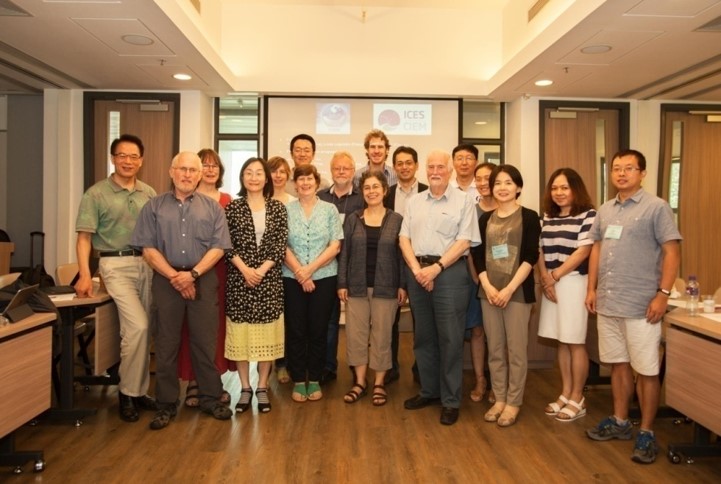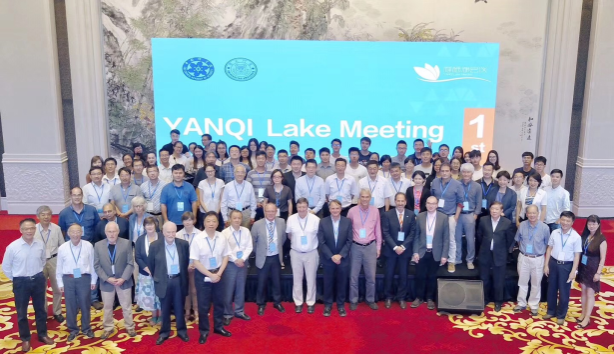A working group on biological mechanisms of marine carbon sequestration under the International Council for the Exploration of the Sea (ICES) and the North Pacific Marine Science Organization (PICES) was formed in 2015 (http://meetings.pices.int/members/working-groups/wg33; and http://ices.dk/community/groups/Pages/WGCCBOCS.aspx). This WG promote interdisciplinary exchanges among the research communities by bringing together experts who have experience using observational, experimental and modeling approaches to characterize and assess the biologically-driven ocean carbon pumps and their environmental and climate consequences. The working group has the objective of improving prediction and advice for climate policy and adaptation to a changing environment. It had been successfully carried on with a series of scientific progress achieved and terms of reference completed.
The WGCCBOCS organized a series of WG meetings to meet its Terms of Reference (ToRs), including (1) a kick-off meeting at Hong Kong, China (June 17, 2016); (2) a business meeting and workshop in Qingdao, China (September 16-18, 2017); (3) a business meeting in Vladivostok, Russia (PICES 2017 annual meeting, September 24, 2017); and (4) a business meeting in Yokohama, Japan (PICES 2018 annual meeting, October 28, 2018). In addition, the WGCCBOCS organized: a joint ICES-PICES Topic Session on “Anthropogenic effects on biogeochemical processes, carbon export and sequestration: Impact on ocean ecosystem services” during the PICES 2017’ Annual Meeting in Vladivostok, Russia (September 26, 2017); and a joint Theme Session on “Carbon uptake, ocean acidification, and ecosystems and human impacts” at the PICES/ICES/IOC/FAO 4th International Symposium on “The effects of climate change on the world’s oceans” in Washington, DC, USA (June 4-8, 2018).
The WGCCBOCS also co-organized/supported the following five activities: two Gordon Research Conference on Ocean Biogeochemistry in Hong Kong, China (June 12-17, 2016, and July 8-13, 2018); a meeting of the International Advisory Committee (IAC) of the Marine Environmental Chamber System (MECS) at Shandong University, China (September 17, 2017); the Yanqi Lake Conference in Beijing, China (September 19-22, 2017); and a workshop on Biogenic Element Cycling Processes and Effects in Xiamen, China (November 8-9, 2018).

Figure. The kick-off meeting of WG33 at Hong Kong
In 2017, WG33 organized a series of activities including Yanqi Lake Conference in Beijing, China. The Yanqi Lake Conference was co-chaired by five academicians from four countries, including Nianzhi Jiao, Member of Chinese Academy of Sciences (CAS), Farooq Azam, Fellow of American Academy of Arts and Sciences, Louis Legendre, Fellow of the European Academy of Sciences, Curtis Suttle, Fellow of the Royal Society of Canada. The speakers included Dr. Hong Wang, Minister of the State Ocean Administration, Academician Guanhua Xu, Former Minister the Ministry of Science and Technology of China; Dr. Hong Mei, Deputy Director of Academic Works and Publications Committee of the Academic Divisions of CAS; Dr. Salvatore Arico, Head of Ocean Science Section, Intergovernmental Oceanographic Commission of UNESCO.

Figure. The opening ceremony of Yanqi Lake Conference.
As a result of these activities, the WG published three perspective papers, three invited review papers and a discussion forum in National Science Review, and organized two special issues in Science China-Earth Science. Prof. Nianzhi Jiao is actively involved in the Intergovernmental Panel on Climate Change (IPCC) 6th Assessment Special Report on Ocean and Cryosphere, which will be released in 2019.
In the perspective paper, Prof. Nianzhi Jiao, Hong Wang, Guanhua Xu and Salvatore Aricò highlighted the importance of ocean carbon sinks in mitigation of climate changes, and identify the invisible microbes as one of the key components of blue carbon in oceans. In addition, they proposed land-sea integrated countermeasure for carbon sequestration and sustainable development of the coastal ecosystem. The eco-engineering proposal based on MCP brings new policy as bonus-based carbon trade rather than penalty-based pollution policy as being used in many countries nowadays. The bonus-based policy would be such that any economy loss claimed to the reduction of farming fertilization (should not be the case if fertilization is scientifically applied, though) and sewage work in the watersheds can be compensated by the eco-value or carbon price of the increment of carbon sequestration in the sea. Once carbon accounting system for the watershed-coastal-offshore environments is established, a blue carbon sequestration based voluntary emission reduction trading mechanism could be easily developed.
(Edited by Rui Zhang)
(Editing Contact:xjz@xmu.edu.cn)